rraa1 [ràá] vb. 1. to dab (something)
on; to smear with a cream or some
solution: (e.g. paint): Ọ ya orhue
rraa uhunmwun ― “He dabbed chalk
on his head.”; 2. to caress esp. (with
the palm); to rub back and forth: Ọ
gha ya obọ rraa ẹre egbe ― “She is
caressing him with her hand.”
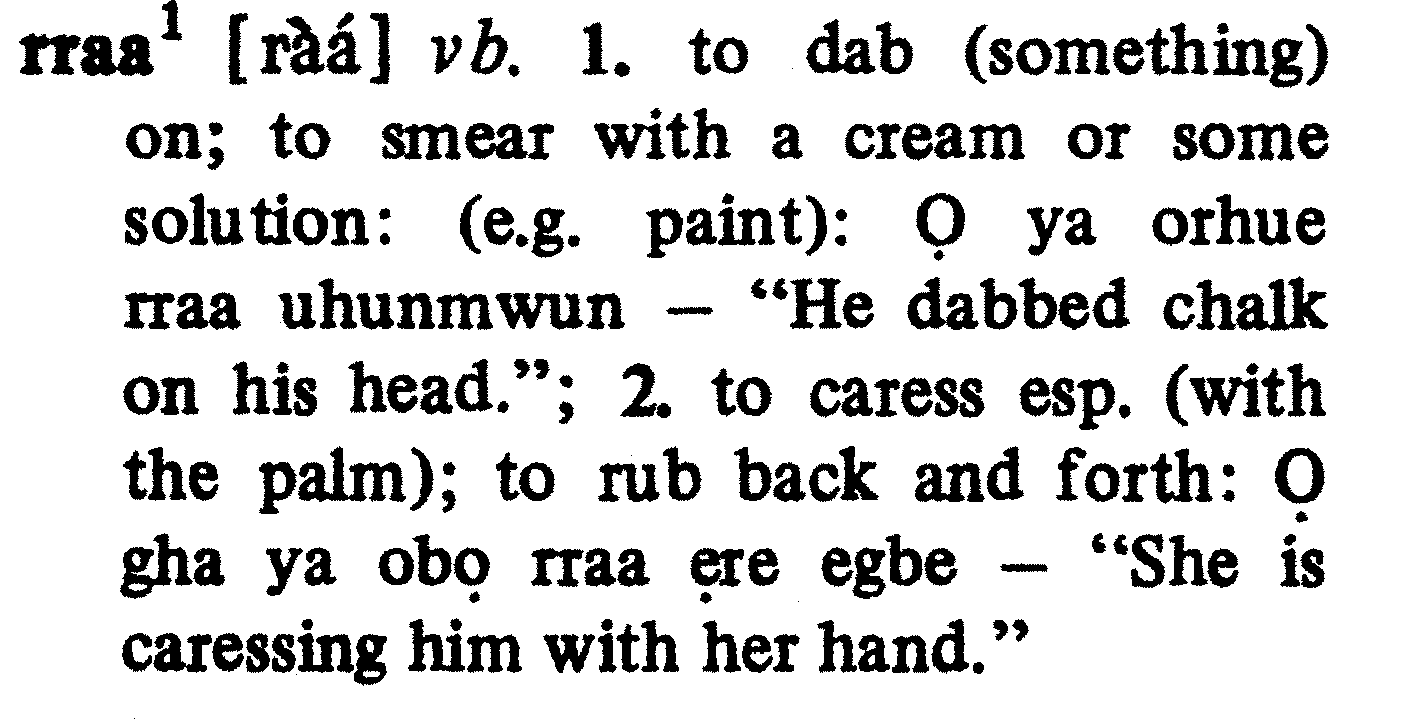
rraa2 [ràá] vb. (usually in combination
with fian ― to cut): to cross: Ọ fian
ukpo rraa ― “He cut across the road:
he crossed the road.”

rraa3 [ràá] vb. to catch something that
was thrown into the air: Ọ rraa ibolu
ne a fi giẹe ― “He caught the ball
that was thrown to him.”

rraa4 [ràá] vb. to commit a breach (of
the law); to fail in the application
of a rule: Ọ rra uhi ― “He broke the
law.”

rraa5 [ràá] vb. (with ikpowo ― por-
ridge) to prepare (porridge), to cook
(it).: Ọ ma rẹn vbe a rraa ikpowo
hẹẹ ― “He did not know how to
prepare porridge.”

rraan [rã̀ã́] vb. 1. to heat up (e.g.
cold soup); 2. (of egbe ― body):
to be well, sound: Egbe ma rraan
%%

mwẹn ― “Body is not sound for me:
I am not well; I am ill.”; 3. (of
weather) to be crisp and nice: ehe
hia rraanrẹn ― “Everywhere is crisp
and bright”.

rrabọ [ràbɔ́] vb. (< rraa1 ― obọ) “to
rub hands”: to rub palms together
in a gesture expressive of supplication,
respect or praise.

rre [ré] vb. 1. to be located at: Iran
rre ughugha nii ― “They are in that
room.”; 2. to be available at: Egbẹ
ọna vbe rre ẹvbo ima ― “This variety
is also found in our town” (when
there is no direct locative complement,
or when a prep. occurs before the
locative, the form used is rrọọ):
Eso vbe rrọọ vbe ughugha nii ― “There
are also some in that room.”
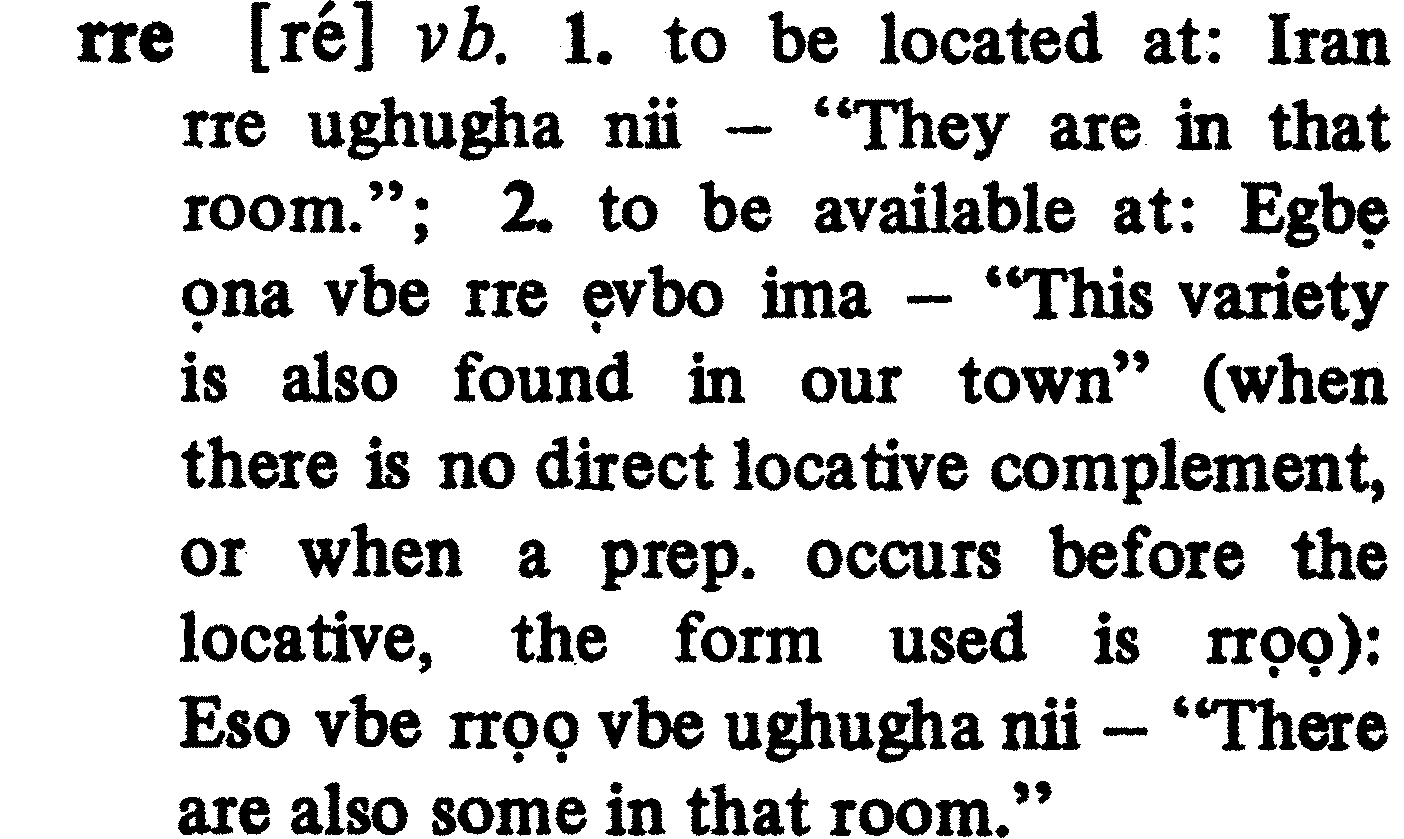
rre [réè] vb. 1. to arrive: Node ẹre ọ
rre ― “Yesterday was when he arrived”
(with this sense, it usually does not
take a locative complement); 2. to
come (when there is a locative com-
plement it becomes rri): I rre, sokpan
i ma miẹ omwan rhọkpa vbe owa ―
“I came but I did not find anybody
at home”; I rri emwan, sokpan . . .
“I came here, but . . . .”^ (with this
sense, rre is replaced by dee in the
$Page 133$
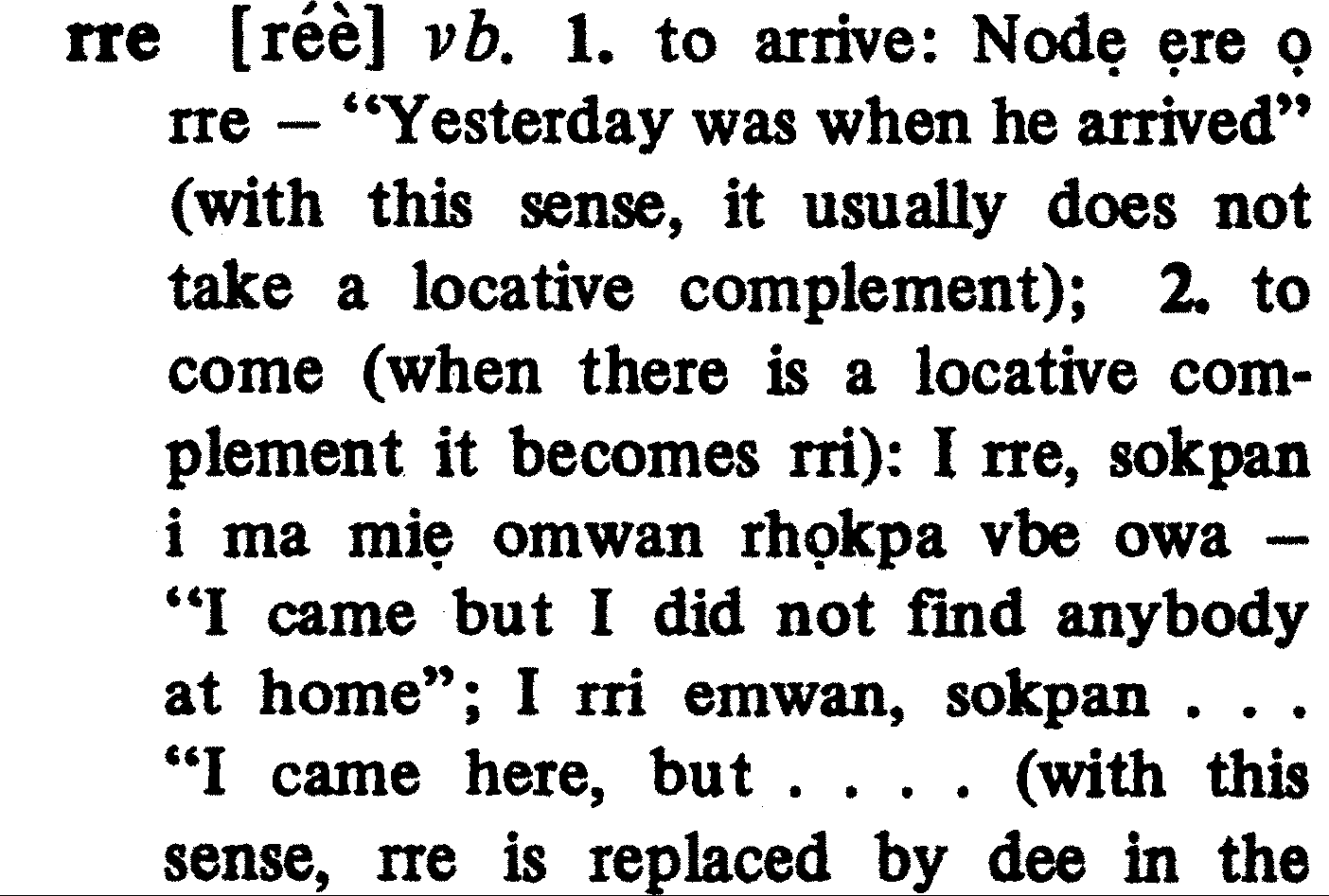
progressive aspect)^: I dee ― “I am
coming” (when there is a locative
complement, dee becomes di): I di
owa ruẹ ― “I am coming to your
house.”

rree [rèé] vb. to be distant; to be
remote (in both time and space):
Eko rree vbe Ẹdo ― “Lagos is far
from Benin”; Ọ rreere ne a ghi ru
ẹre ― “It is a long time ago that
it was done.”
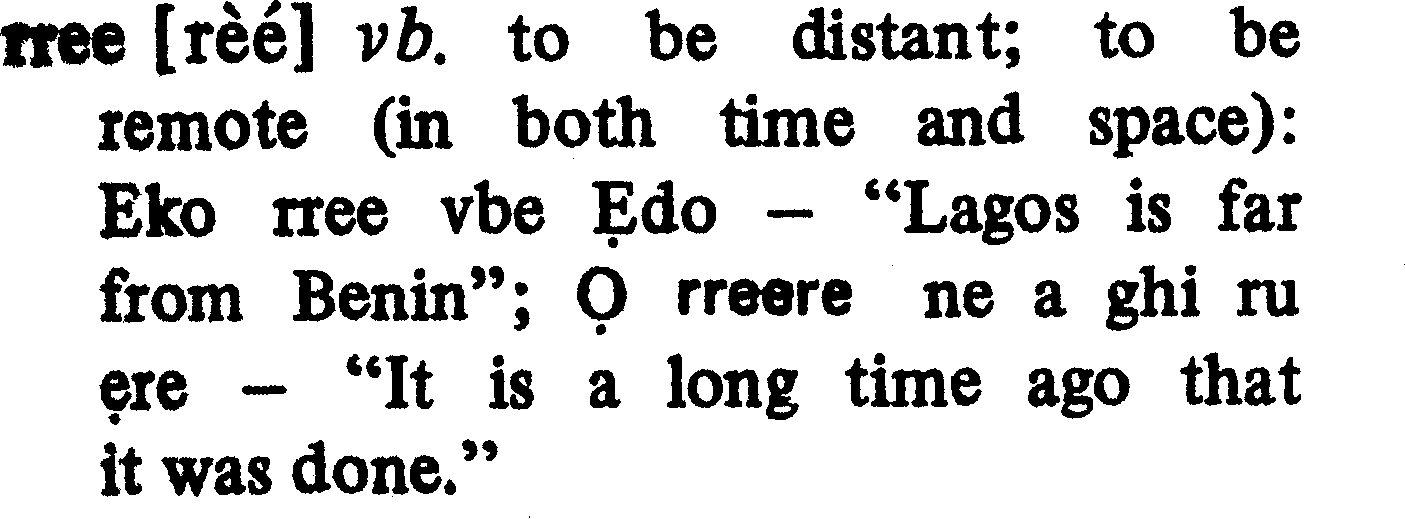
rri1 [rí] vb. 1. to tie a knot; to fasten:
Rri ere mu aberhan ne ọ ghẹ lẹ fua ―
“Fasten it to a branch so that it
may not run away.”; 2. (with mu):
to tangle; to get stuck: Ọ mu rri ―
“It has tangled.”
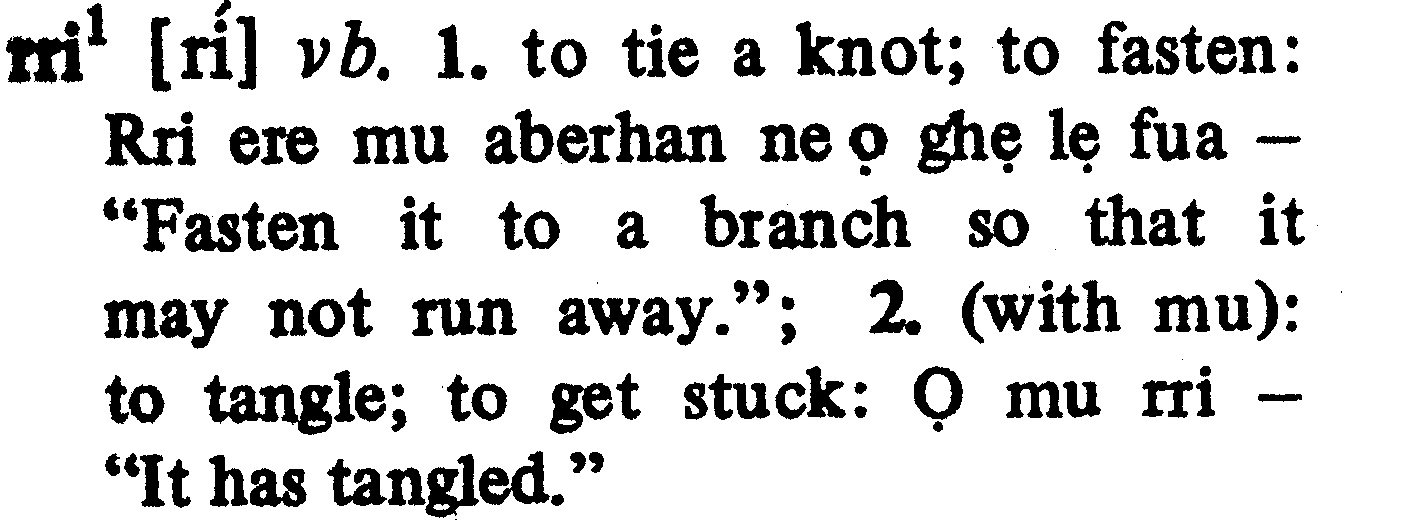
rri2 [rí] vb. 1. to tread upon; to trample:
ọ ya owẹ rri mwẹn ukpọn mu otọ ―
“She trampled over my cloth.” (cf.
rrilo).

rri3 [rí] vb. the transitive form of re
(1, 2 & 3): Ọ rri izẹ ― “He ate rice.”

rria1 [rìá] vb. to rinse out: Ọ rria
ukpọn hẹ ye ovẹn ― “She rinsed
clothes and put them out in the
sun.”

rria2 [rìá] vb. to extrapolate; to inter-
pret into more familiar terms (e.g.
of a configuration in an oracle).

rriabe [ryàbé] vb. (< re3 ― abe) to
be guilty (in a case).

rriaikhi [ryàìxí] vb. to avenge; to take
revenge.

rriara [ryàɽá] vb. to be bitter, un-
pleasant, sour.

rriarria [ryàryá] vb. to hover around
(a person) with a craving for a share
of his/her food: Ọ gha rriarria ye
%%

ọre evbare ― “She is hovering around
with a craving for his food.”

rriase [riàsé] vb. (< re3 ― ase) to be
innocent (in a case).

rrie [rìé] vb. 1. to retreat; to go away:
Ọ gha ru ẹre fo nẹ, ọ rrie ― “When
he has completed it, he will go away”.;
2. to be in the process of going (to
a place); to be on the way to: Ọ rrie
uhunmwun ne a gie ẹre ― “He is
on his way on the errand which he
was sent.” Ọ rrie owa ― “He is on
his way home.”
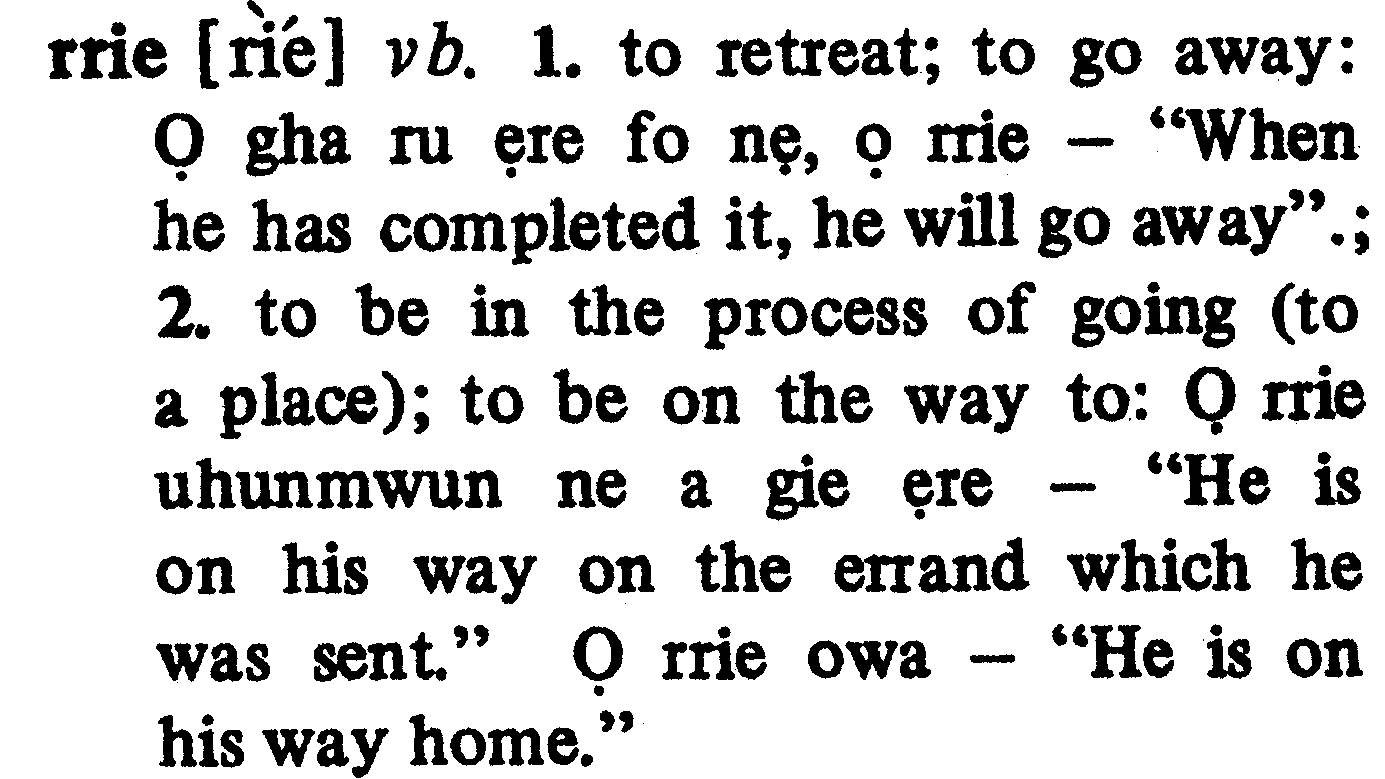
rriẹrriẹ [ryɛ̀ryɛ́] vb. (of something cook-
ing over an open fire) to turn over
or around; to adjust over the fire
(so that it doesn’t burn).

rrievbare [ryèʋàɽé] vb. (< re1 ― evbare)
“to eat food” ― generally means
“to eat” when nothing specific is
indicated.

rriẹ [ryɛ́] vb. to be smooth: Gie ẹre
rrie ― “Let it be smooth.”

rriẹ [rìɛ́] vb. to make smooth; to cause
to be smooth: Ya okuta rriẹ ọre ―
“Smoothen it with a stone.”

rriẹrriẹ́ [ryɛ̀ryɛ́] vb. 1. to loiter; 2. to
frequent a place ― Ọ rriẹrriẹ vbe owa
ọre ― “He visits her house frequently.”

rriẹrriẹ̀ [ryɛ̀ryɛ̀] adv. (of colour): pale:
Ọ baa rriẹrriẹ ― “It is pale red (i.e.
pink)”^; 2. (of temp.) mild, lukewarm:
Ọ tọn rriẹrriẹ ― “It is mildly hot:
it is lukewarm.” (also rẹghẹrẹghẹ).

rrii [rĩ̀ĩ́] vb. to keep domestic animals
(not as pets, but as livestock): Ọ
rrii ẹwẹ ― “She keeps goats.”

rrilo [rìló] vb. 1. the plural or reitera-
tive sense of rri 1. and 2.: Ọ rrilo iran
$Page 134$

mu erhan ― “He tied them to trees.”
Ọ ya owẹ rrilo mwẹn ukpọn ― “She
trampled over my clothes.”; 2. to
massage: Ọ ya amerhẹn rrilo ẹre egbe ―
“She massaged his body with hot
water.”
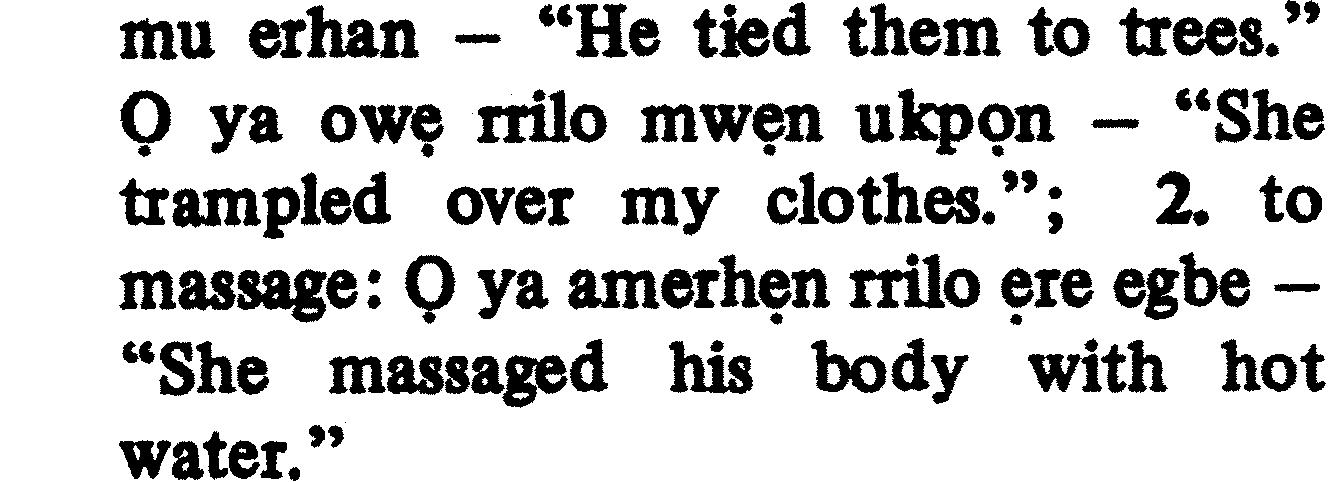
rriokodẹ [ryòkódɛ̀] vb. (< re2 ― okodẹ)
“to acquire what one was entrusted
with” ― to embezzle.

rriosa [ryòsá] vb. (< re3 ― osa) “to
incur debt”: to be in debt; to owe
(usually money): Ọ rri Ozo osa ―
“She owes Ozo money.”

rriovan [ryòvã́] vb. (< re2 ― ovan)
“to acquire a nickname” ― to bear
as a nickname: Ọ ya Ọsa rriovan ―
“He has “Ọsa” as a nickname.”

rrioya [ryóyà] vb. (< re3 ― oya) “to
incur insult”: to suffer.

rriukhu [ryùxú] vb. (< re2 ― ukhu)
“to acquire inheritance” ― to inherit.

rroo1 [ròó] vb. to process by heating
(e.g. of pepper or okro).

rroo2 [ròó] vb. to be strong and in-
delicate (e.g. of pottery).
%%

rrọ́ọ [rɔ́ɔ̀] vb. to exist; to be: Igho
ye rrọọ ― “Money still exists: There
is still money”; Emwan eso rrọọ ne
ẹi gua tie ebe ― “There are some
people who cannot read.”

rrọ̀ọ1 [rɔ̀ɔ́] vb. 1. to endure; to bear:
Egbe mwẹn i-rrọọ ẹmwẹn ọnrẹn ―
“My body cannot endure his matter
i.e. I am not able to undertake re-
sponsibility for him”; 2. to accom-
modate; to have capacity for (in
terms of volume): Ọgọ na i-rrọọ
ehia ― “This bottle cannot accom-
modate all” (also gua).
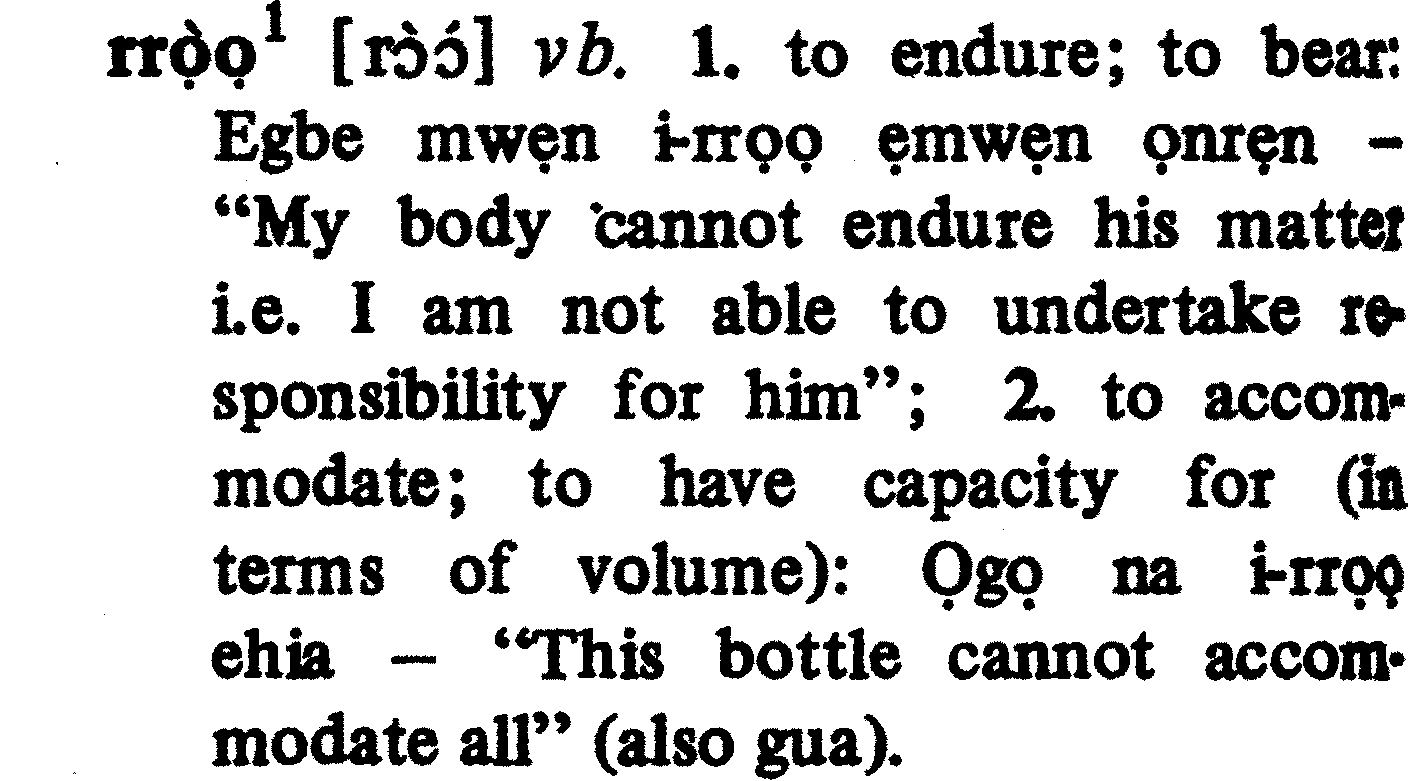
rrọọ2 [rɔ̀ɔ́] vb. 1. to stir, to turn over
(e.g. of soup) Rrọọ uwọnmwẹn nii
ne ẹi ghẹ giẹn ― “Stir that soup so
it may not burn.”

rrua [rùá] vb. 1. to push; to shove: Ọ
rrua mwẹn gbotọ ― “He pushed me
down.”; 2. (usually of limps) to
bump; to knock (against something):
Ọ rrua owẹ ― “He bumped his foot.”

rruan [rũ̀ã́] vb. to afflict: Ẹbe rruan
rẹn ― “Adversity has afflicted him.”

rruọrruọ [rwɔ̀rwɔ́] vb. to talk in
coherently; to babble.
